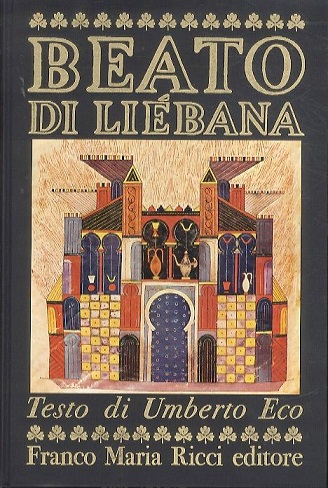Umberto Eco, RIP
[ by Charles Cameron — he was a man of word, wit and wisdom ]
.
The world was chastened last evening to learn of the passing from among us of Umberto Eco.
**
Zen has long admired Eco, as readers here will know, if for no other reason then as the original exponent of the concept of the antilibrary, here described by Nassim Nicholas Taleb in his book, The Black Swan:
The writer Umberto Eco belongs to that small class of scholars who are encyclopedic, insightful, and nondull. He is the owner of a large personal library (containing thirty thousand books), and separates visitors into two categories: those who react with “Wow! Signore professore dottore Eco, what a library you have! How many of these books have you read?” and the others — a very small minority — who get the point that a private library is not an ego-boosting appendage but a research tool. Read books are far less valuable than unread ones. The library should contain as much of what you do not know as your financial means, mortgage rates, and the currently tight real-estate market allows you to put there. You will accumulate more knowledge and more books as you grow older, and the growing number of unread books on the shelves will look at you menacingly. Indeed, the more you know, the larger the rows of unread books. Let us call this collection of unread books an antilibrary.
My own taste, as you know, runs to th apocalyptic, and I have long lusted for his sumptuous edition for Franco Maria Ricci of the Beatus of Liebana commentary on the Book of Revelation. I am grateful to discover I do have in my possession the second issue of FMR magazine, with Eco’s essay Waiting for the Millennium (pp 63-92) containing a number of the plates from that larger work.
It was blog-friend Laura Walker who alerted me to Eco’s passing, with the graceful comment:
He is the best ambassador of the Middle Ages – thought, aesthetics, philosophy, humor, humanity – it’s as if he sends his works from there..
Indeed. We lament his passing.




February 20th, 2016 at 11:19 pm
Thank you, Charles, and Laura.
.
Count me among fans of Eco; his Kant and the Platypus isn’t as well-known, but has become a source I return to many times a year.
.
RIP
February 21st, 2016 at 5:32 am
Thank you for the mention Charles. I am a big fan of the antilibrary concept which I picked from Eco by way of Taleb. My antilibrary contains some Umberto Eco, namely Focault’s Pendulum and The Name of the Rose, a gift from a friend I would never have expected to be an Eco fan, other than his being exceptionally smart. Perhaps it is time to read one of them.
.
For that matter, Hesse’s Glass Bead Game too. So much to read. So much to write. So little time
February 21st, 2016 at 6:15 pm
Hi Zen:
.
It’s funny you should mention The Name of the Rose and The Glass Bead Game in the same post. I gather there was quite an attempt to get Eco to cut the first hundred pages of Rose before it was published. Eco himnself writes in response:
As a lover of the Benedictine monastic tradition, of Gregorian Chant and the great cathedrals and abbeys, of Erwin Panofsky’s Gothic Architecture and Scholasticism, and Etienne Gilson’s Heloise and Abelard, I find those first hundred pages quite wonderful.
.
Hesse’s Glass Bead Game, on the other hand — if I may be utterly heretical close to home — strikes me as a novel that would be utterly ignored were it not for two brilliant and interwoven conceits — the Game itself, and the monastic / educational province of Castalia which nurtures and houses the Game.
.
Both books are monastic, almost celibate, although I think it might be fair to argue that monasticism itelf embodies a conjunction of “male” and “female” sympathies (I detest those words, preferring the Chinese “creative” and “receptive”, or Eliot’s “agent” and “patient”). But for those lacking my interest in monasticism, I think that makes Hesse’s book a dry one as far as narrative is concerned. Eco’s book by contrast, is anything but dry IMO — but then Eco’s is a crime thriller, and Hesse’s book is at some exalted level a game proposal.
.
I’ve devoted around twenty years to designing, playing, and refining my own family of games based on Hesse’s GBG, though, so clealrly Hesse’s is the more important book for me — as it manifestly also has been for such luminaries as John Holland and Christopher Alexander.
.
When I read Rod Dreher on The Benedict Option, I wish I’d spent as many years again on Hesse’s proposal for a non-religious — yet transcendent, and far from irreligious — monastic system.
March 1st, 2016 at 2:05 am
i still say that “antilibrary” is a mistranslation from italian. the correct translation is surely “ante-library” or “antelibrary”. oh well, onward anyway….
March 1st, 2016 at 7:27 am
David —
.
I think the coinage is Taleb’s, and Zen said in response to a previous comment along the same lines, “as Taleb knows six or seven languages more than I do, I fear that if I corrected him he would then deliver a pun against me in old Syriac.”